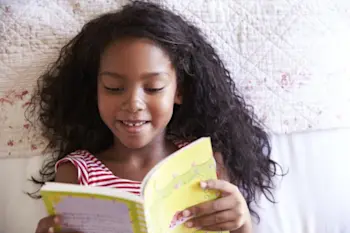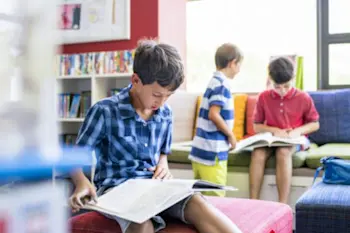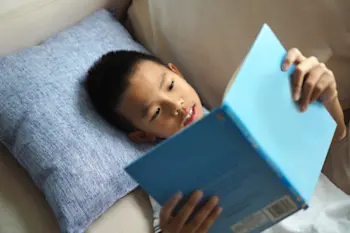Reading for pleasure and why it’s important for kids

Reading is not just something that children should do in school, it needs to be an everyday part of our lives and something we choose to do at all ages! Here’s why reading for pleasure is so important…
Dr Seuss once said, “You can find magic wherever you look. Sit back and relax, all you need is a book.”
We know from talking to many of our parents that often the biggest challenge is not simply getting their child reading at home, but to getting them enjoy reading too! Often children will read a book set at primary school, but are reluctant to pick up a book to read at home for pleasure.
However, the question “does your child read for pleasure?” is a phrase that can be surprisingly hard to define.
What is reading for pleasure?
Reading for pleasure is something that we do of our own free will and get satisfaction from. Sometimes, someone might have originally asked us to read something but we continue because we’re interested in it! According to Nell (1988), reading for pleasure is a form of play that allows us to experience other worlds and roles in our imagination.
For children, reading for pleasure is reading that goes beyond their teacher’s reading expectations and is done to fuel their own curiosity and enjoyment. Every child might enjoy a variety of genres, authors or materials. It’s important to encourage them to read something they enjoy, that’s what reading for pleasure is about!
Why is it important to read for pleasure for kids?
There are plenty of benefits for those who enjoy curling up with a book. A report carried out for The Reading Agency revealed convincing evidence that reading for pleasure can increase empathy, improve relationships with others, reduce the symptoms of depression and improve wellbeing throughout life.
Reading for pleasure for kids research
Research has also shown that students who choose what and where they read tend to be more motivated, read more and show greater language and literacy development. The study by academics at the Institute of Education, part of the University of London, found that reading had the strongest effect on vocabulary development but the impact on maths and spelling was also significant.
Here are some key research findings
Evidence suggests that there is a positive relationship between reading frequency, reading enjoyment and attainment (Clark 2011; Clark and Douglas 2011).
Pupils who read more are also better readers (Clark and DeZoya 2011)
The benefits of reading for pleasure
Reading for pleasure has also been positively linked with an increase in the following literacy-related benefits for children:
Reading attainment, phonics and writing ability
Text comprehension and grammar
Improved spelling
Breadth of vocabulary
Positive reading attitudes
Greater self-confidence as a reader
Pleasure reading in later life
Greater all-round academic success
Despite so many positive links, over recent years there has been a definite decline in children picking up a book outside of school. Some parents fear that the increased access to technology, like tablets and games consoles, has got in the way of children’s traditional love of reading.
However, there are many benefits of screen time and we can actually use technology to help capture children’s interest in books! Most children see using a tablet as a fun activity and therefore accessing literature in this way can increase their enjoyment and confidence, resulting in a positive impact on their reading.

How to encourage your child to read for pleasure?
Encouraging reading for pleasure for children opens up a world of imagination, knowledge and joy. Here are some practical tips to help ignite a passion for reading:
Create a Reading Space at Home: Designate a cosy, inviting spot in your home just for reading, equipped with good lighting, comfortable chair or sofa and ideally quiet.
Discuss What They Read: Talk about books during dinner time or morning drives to school. Ask open-ended questions about the stories or book characters.
Connect Books with Activities: Pair reading with fun activities like movie nights based on the book. Consider participating in literature events like the World Book Day – we all know dressing up as your favourite book character can be fun!
Variety is Key: Keep a wide range of books accessible, featuring different genres and topics to match your child’s evolving interests. If you don’t have many books available at home, sign your child up to a library. Learn more about the benefits of library in our guide!
Lead by Example: Let your child see you reading regularly. Your enthusiasm can show them what reading for pleasure looks like.
These strategies can help turn reading into a joyful and regular part of your child’s life
Reading for pleasure KS2 book recommendations
The main thing to remember when helping your child find a book to read at home is to focus on their interests and passions. When children choose their own reading material they tend to be more motivated, so it helps if they lead the process!
From animals to action and adventure, here are some ideas to get you started…
Year 3
Fantastic Mr Fox – Roald Dahl
The Invisible Boy – Trudy Ludwig
My Secret Unicorn – Linda Chapman
The Adventures of King Arthur – A Wilkes
Revolting Poetry to Make You Squirm – Susie Gibbs
Year 4
The Village Dinosaur – Phyllis Arckle
The Snow Spider Trilogy – Jenny Nimmo
Awful Auntie – David Walliams
The Roman Mysteries: The Thieves of Ostia – Caroline Lawrence
Earth Giant – Melvyn Burgess
Year 5
The Hundred and One Dalmations – Dodie Smith
Holes – Louis Sachar
The Spud from Outer Space – Susan Gates
War Boy – Michael Foreman
Northern Lights – Philip Pullman
Year 6
The Breadwinner series – Deborah Ellis
Kensuke’s Kingdom – Michael Morpurgo
The Diary of Anne Frank
Killer Mushrooms Ate My Gran – Susan Gates
Lionboy – Zizou Corder
Find some more great children’s books in our secondary and primary school reading list for children aged 4-14.

How can Explore Learning support your child in finding reading for pleasure?
Has your child lost their love of reading or learning, or maybe they’re a reluctant reader? We have some great free resources including tips for young writers (yes, writing can also instil reading for pleasure!).
Our English tuition delivered by expert English tutors can help them master their reading skills and feel inspired! Help them develop a love of reading and stories in our tuition centres or online. See how Explore Learning can help by booking a free trial, today!
Cancel anytime
No joining fee
In centre or online
Memberships to suit you
Cancel anytime
No joining fee
In centre or online
Memberships to suit you
Cancel anytime
No joining fee
In centre or online
Memberships to suit you




